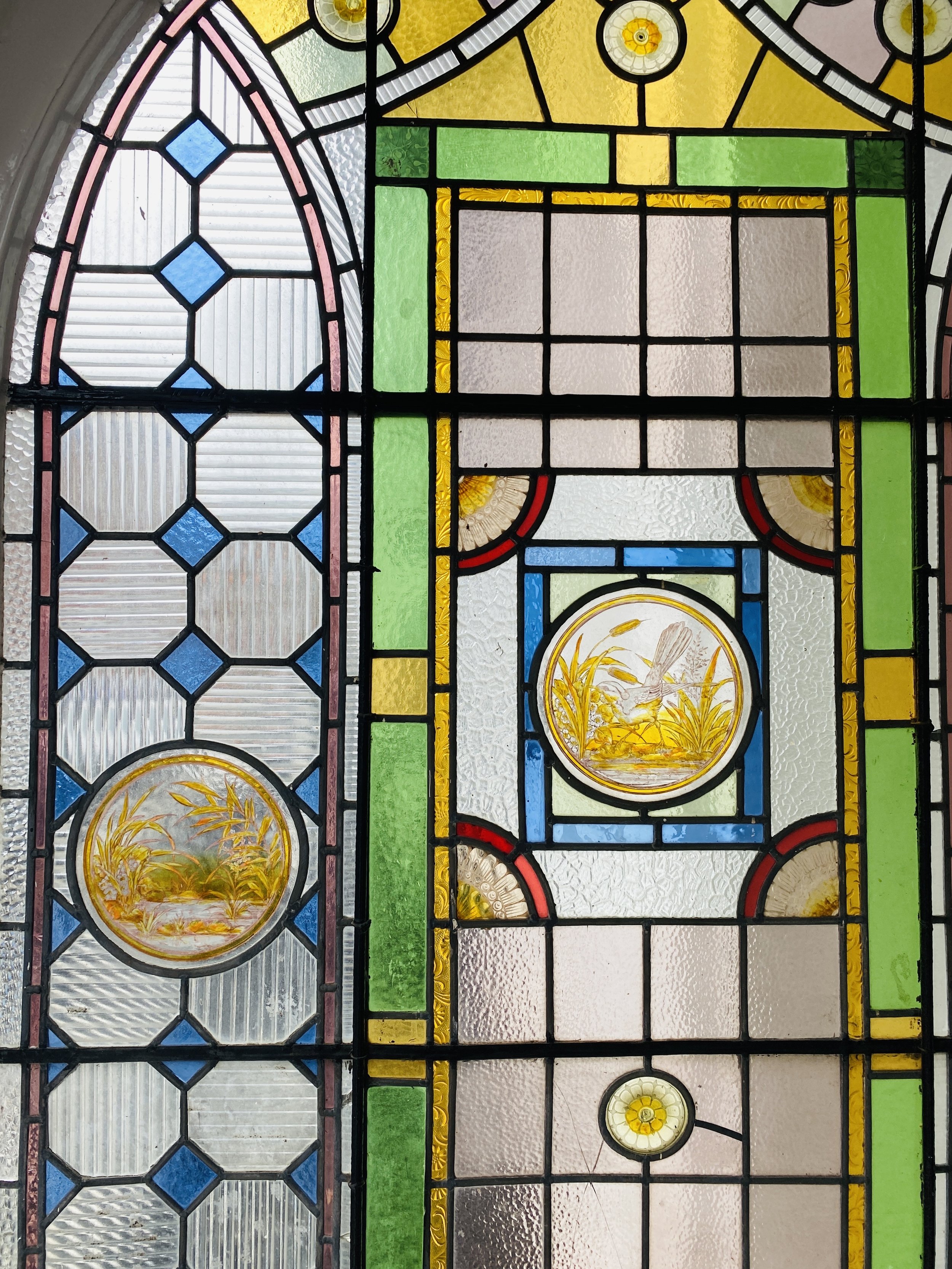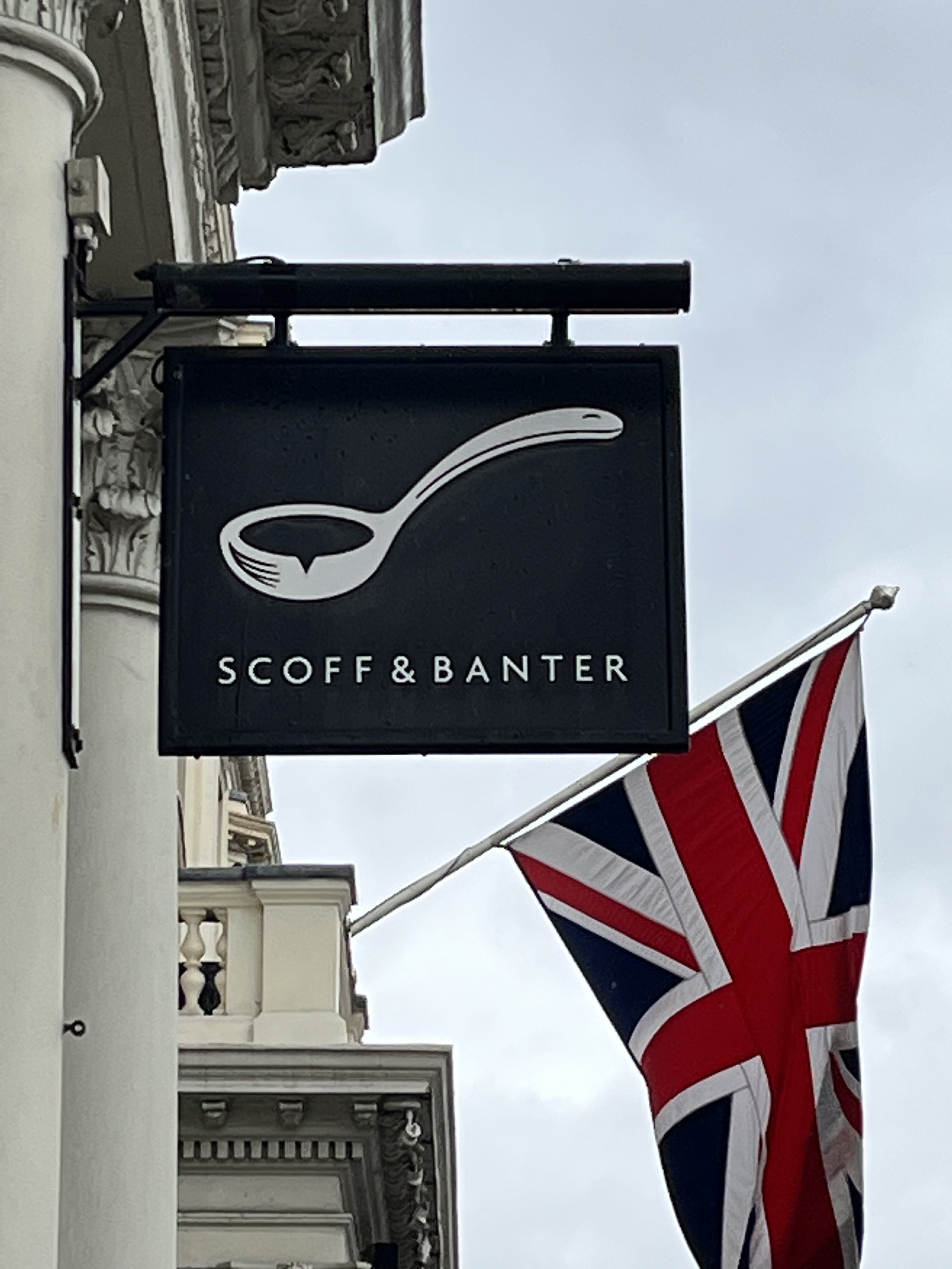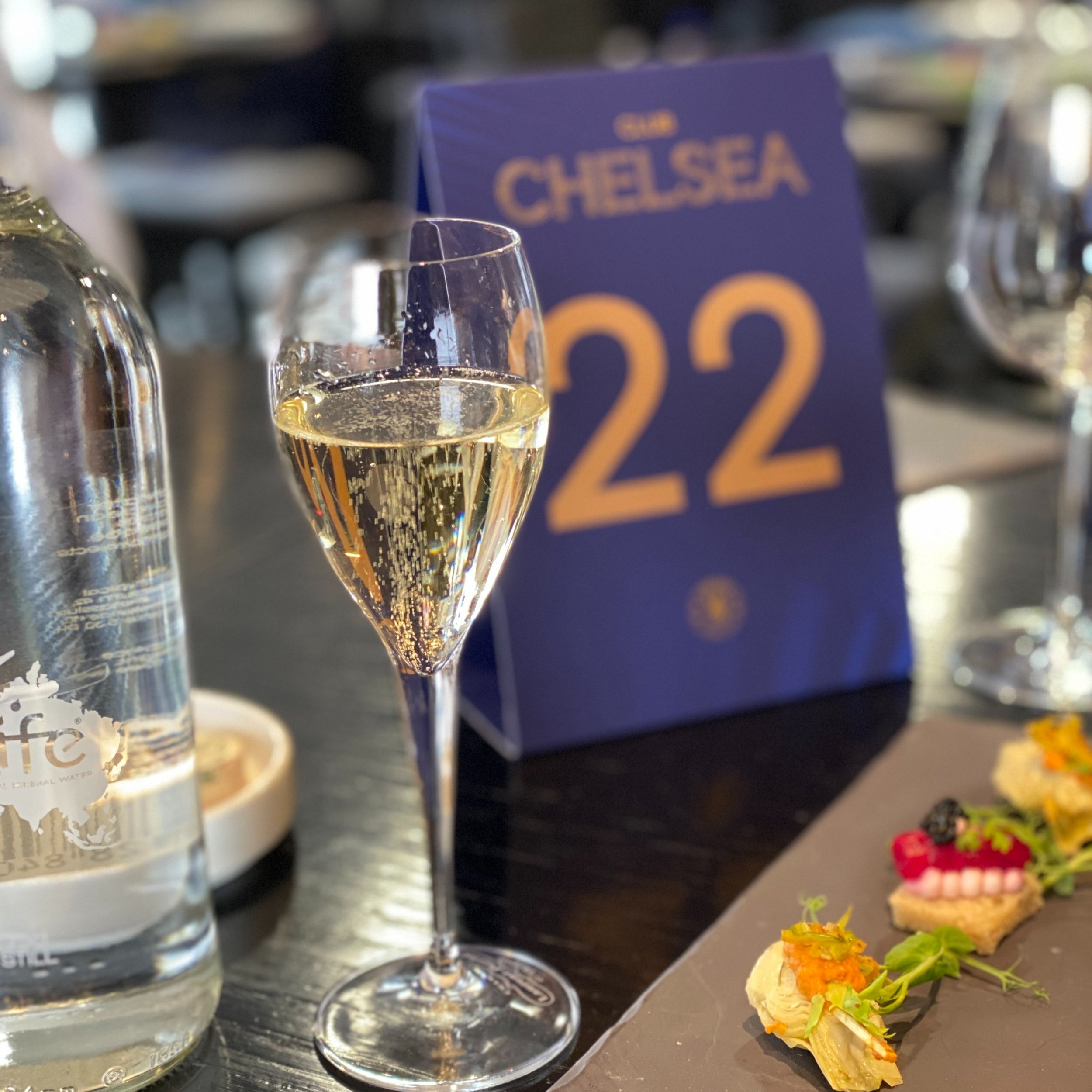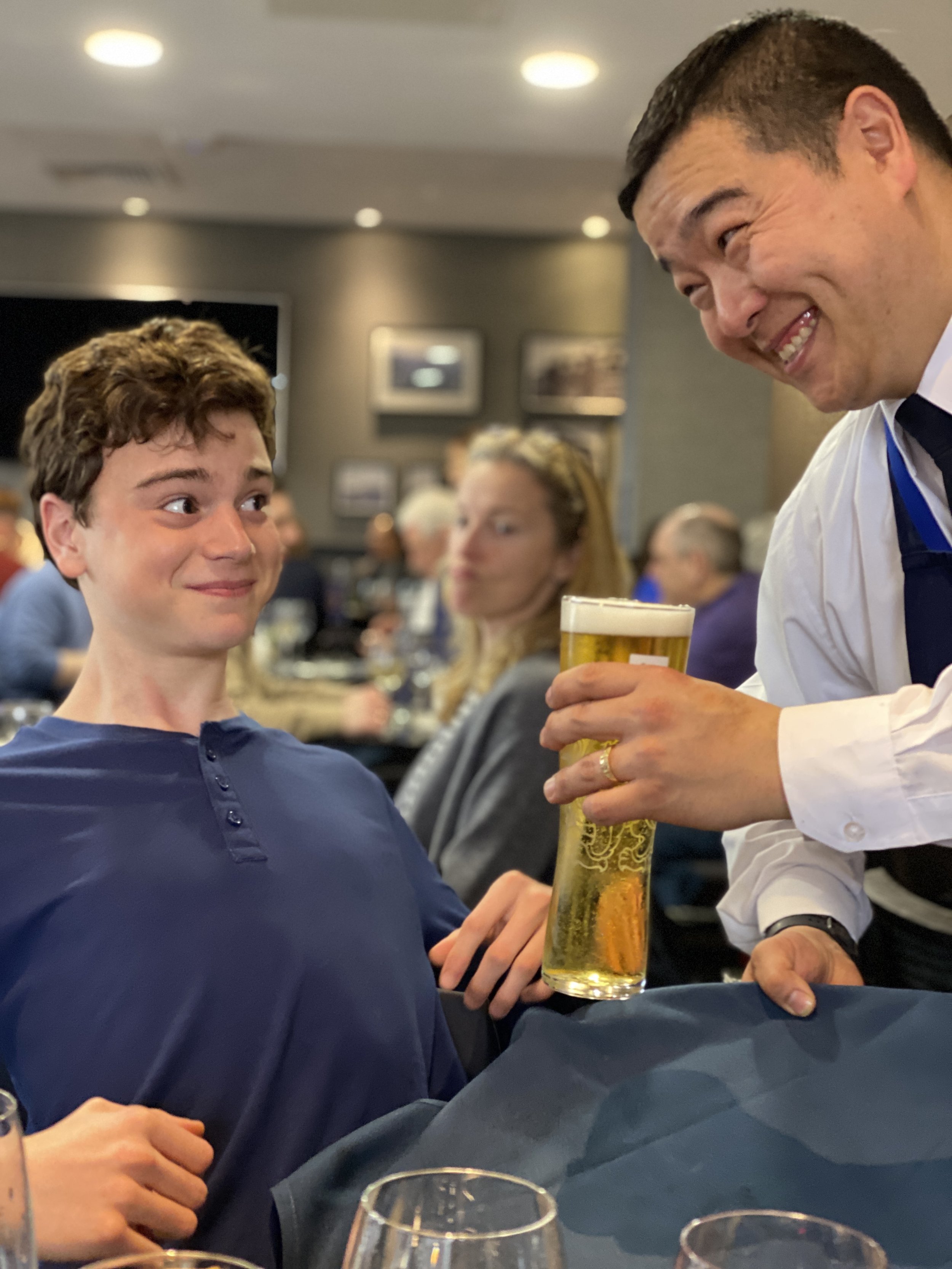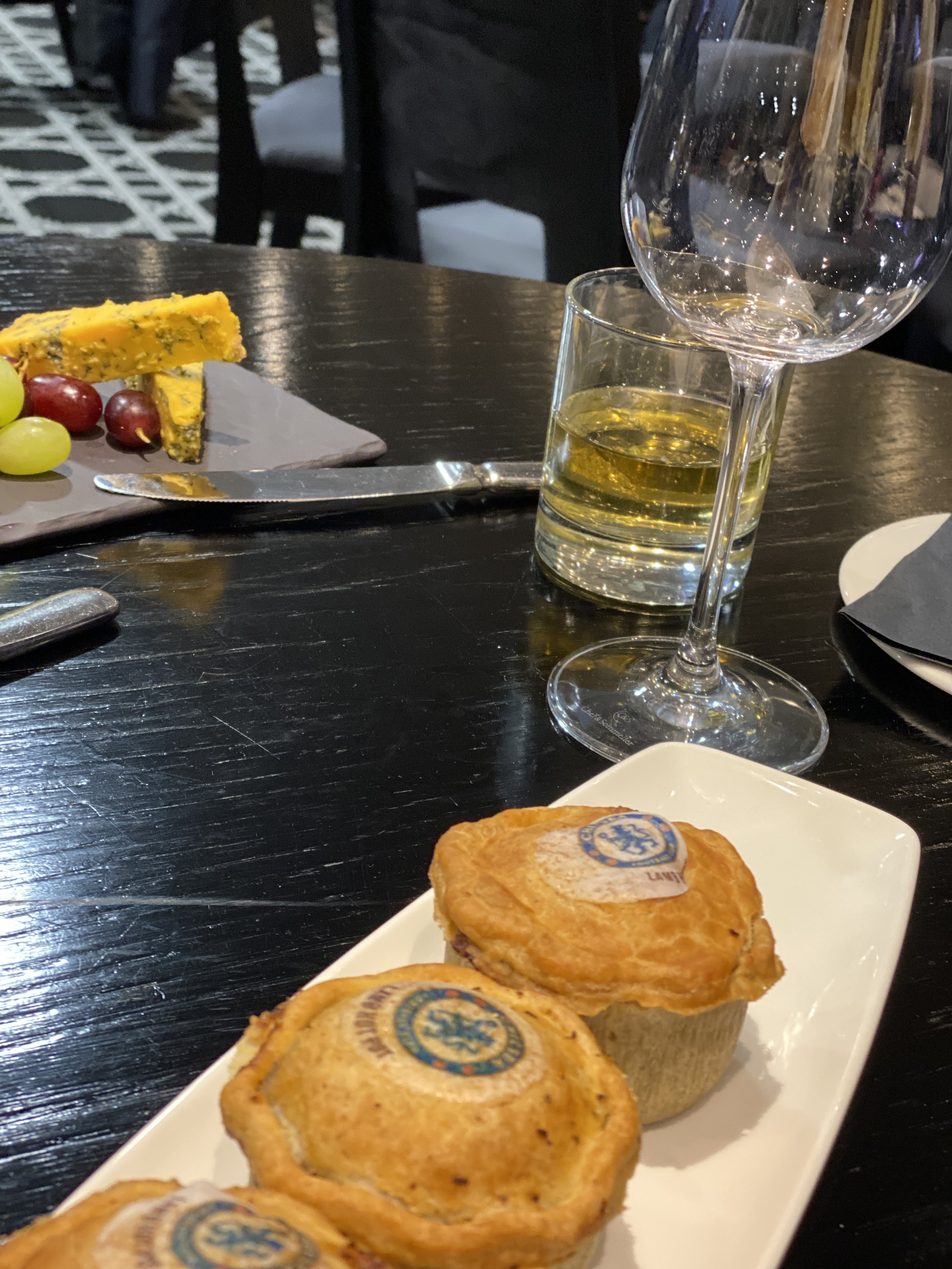Pubs + Football = Spring Break London!
/I like to imagine my family as pretty regular. We vote, we munch popcorn with our movies, and we participate in spirited debates on the merits of designer donuts. But in one major way, we deviate from societal norms. And that is this:
When it comes to spring break, we get as far away from the sun as we possibly can. Usually into the arms of blistering cold. We’ve gone to Toronto (snow in April!), Vancouver (that snow on purpose, a spring break ski trip), and upstate New York.
Plus, there was that year we went to Providence and Manhattan, though those might better fall under the category of “using spring break to visit colleges.”
This year, I thought for sure we’d finally nail the proper spring break thing with a trip to sun-dappled Greece. But no sooner had I started researching Greek wine when the Airbnb host cancelled the reservation. I wasn’t nearly disappointed enough, which cued me to maybe what I wanted for an April vacation was less sunny seas and more moody skies.
Enter Scotland.
This wasn’t the first time we’d mulled a whisky-and-porridge soaked trip to the British Isles. In fact, long ago, Scotland held top billing as the first leg of our year-long around-the-world trip. A trip that COVID blew up. I had spent so many hours imagining hikes through the Highlands, through barren moors (do they have moors in Scotland? Come to think of it, what is a moor? I imagine a stretch of deep and boggy grass, dampening petticoat hems, but I might well have that wrong), past crumbling castles, laced with fog. With the docket once again open, I felt the pull to take the trip that everyone’s favorite pandemic burned down.
Just a random vestibule in London
I did have a moment of pause. I mean, the rain in Scotland’s off-season is pretty notorious. Then again, non-stop rain is a risk for any trip to Scotland, even the warm weather ones. Anyway, summer brings midges to Scotland, and after living through Italian summers marked by papatacci bites, we were happy to swap biting flies for low sun odds.
We booked it.
Now, as you might guess, flights to Scotland from the US go primarily through London. Which gave me a thought. Why not take in a Premier League Football game on our way north?
I love soccer, which for the rest of this article I’ll refer to as football, and trust American readers to effectively swap out the image of shoulder pads and aggravating 10 seconds of action at a time for the balletic grace and raw athleticism of the sport that is known as football in the rest of the world. Anyway, as much as I love the Beautiful Game, I only ever follow it during World Cup and Euro Cup seasons. Ted Lasso taught me that such a thing as Premier League Football existed, but honestly I didn’t really get it.
Strolling through chelsea
Since I know many Americans are equally ignorant, let me fill you in on what I’ve learned since my youngest thew himself headlong into the Premier League to assuage his post-World Cup doldrums. When Gabe falls headlong, know that’s the best I can characterize his wholesale obsession. He can tell you every player’s purchase price and which were worth it, he spins yarns about rivalries (filtered by geography—i.e. a “derby” pronounced “darby”— history, and alternative grudges), all the while peppering in anecdotes of interpersonal intrigue, both on and off the pitch. But worry not, I promise, this is just a primer of what makes football in Europe different (and, in my opinion, better) from sports in the US.
WAlk to stamford bridge through a graveyard, stadium looming in the background
To begin, there are 20 football clubs in England that are the best of the best, the Premier League. Like any other sporting team (besides national teams), those clubs spend unholy amounts of money to hire players from all over the world and suit them up in their trademark colors and trot them out for games. But unlike professional sports seasons in the US, European football season runs all year, save a few summer months and then only so those players can compete for their home countries on global stages like the World Cup. That is, when the pinnacle football game is not being held in a desert where people have to literally cool pools in the summer. As you can see, I’m still bristling at this last World Cup.
Chelsea history in the graveyard
In any case, the Premier League teams play each other, and their performance in those games dictates their rank in the league. But there are other leagues, that form brackets below the Premier League. Italy’s version is the easiest to understand because their version of the Premier League is Serie A, and the lower performing bracket is Serie B, and so forth. In England, the level below the Premier League is the Champions and below that is League One and League Two.
Here’s where it gets interesting (and may help you understand a plot point in Ted Lasso). The bottom scoring clubs in the Premier League get relegated, which means they move down a bracket to Champions. This is devastating—they lose money from sponsorships, they lose prestige, those players won’t garner as many tasty perks. It’s a big freaking deal.
On the flip side though, the top ranking Champions clubs move UP into Premier League.
What does this mean? Well, it means that unlike American sports, there is a lot on the line. You don’t perform, you are in danger of being relegated. You perform at the top of your class, you can move up to the big league. These things are fluid and they are ever changing.
This creates an excellent ground for compelling stories, of which Gabe would more than happily fill your ear if you give him a crumpet. Or really if you just ask, “What’s up with football, Gabe?” Take, for instance, Grimsby Town. As a historical fishing port, their mascot is Henry the Haddock. In 2017, they had an exceptional year and got promoted into the higher league. Thrilled, they waved their inflatable haddocks (more on that excellent haddock in the Scotland post, coming soon) in celebration. But at their game against Barnet, the Barnet team informed Grimsby fans that they were forbidden from bringing their inflatable haddocks! Shocked and appalled, Grimsby crowdfunded for a mariachi band and set up the musicians at the goal line. Whenever Barnet approached the goal, the band went wild. Distracted and disoriented, the players lost their momentum. In short, Grimsby Town won. How can you not root for more stories like that?
Now, to add more pressure to Premier League performance, the top four English PL clubs play the best clubs from all the European nations in what’s known as the Champions League (which is different than the Euro Cup, where players suit up for their home countries, not their clubs). They play each other for bragging rights at being the best team in Europe (incidentally, they play those games during their regular season, so these guys are playing games about every three days).
So it’s always exciting for PL fans to see if their team will make it to the Champions League. In some countries, that’s not a particularly interesting question, because of “farmers leagues” (you can thank Gabe, once again, for this factoid: How I wish I was still homeschooling him so I could make him tell you all this, like I did with Venetian textiles and the wackiness of the Middle Ages), which means one team dominates the the league, thus, the country has a one horse race. This is true in France—PSG (Messi and Mbappe’s club) is so talent heavy, they handily win each game, meaning they are always on top. The top French club, and candidate in the Champions League, is thus pre-ordained and not so interesting to follow. Though, I should add, while at a pub historically frequented by gravediggers in Edinburgh (more on this, again, in my upcoming Scotland post), we did see PSG summarily trounced by Lyon. But that’s uncommon.
Builder’s arms, our first london pub
And lest you imagine that a team like PSG is so strong, it can’t help but dominate France and probably the rest of the world, let me hasten to add that the club has never, ever won a Champions League. Chelsea, Gabe would want me to oh, so casually mention, has won twice.
Now, I know many of you are here for my Italian content, so let me mention here that Italy’s Serie A league is not a farmer’s league and is well worth following. The documentary Juventus, streaming currently on Netflix, is a great introduction through the lens of Italy’s historic team, as the series follows Juventus in their quest to win the Champions League. The documentary is also a great way to tune your Italian ear, if you listen in the original Italian (with or without subtitles). I really want to go to a Juventus game in Turin, and my eye is on this fall. But more on that later (are you signed up for the Grapevine so you can keep up with my travels, including notification of when I publish my Scotland post? You get a free novella set in Italy just for signing up, plus you’ll get my once monthly newsletter, stuffed with travel tips, recipes, and book recommendations!).
But back to England.
Brits know how to name their pubs, don’t they?
As I alluded to above—and the photos might have cued you—Gabe is a died-in-the-blue-wool Chelsea fan. He says this follows exhaustive research about the fans and teams. We like to irritate our youngest by speculating that he probably just did a Buzzfeed quiz, but we know that as a kid who reads the fine print on every use agreement he signs, he definitely did his due diligence. Anyway, Gabe says he chose Chelsea because they usually run in the middle of the pack, which makes it more exciting than if they were steady leaders or always at risk of relegation. Last year they were in the top four, which means they are participating in the Champions League right now (as of April, 2023). For the record, PSG is already out.
walking through chelsea, Chelsea hat firmly on
So once we decided on Scotland, I checked Chelsea’s schedule and found that they had a home game April 1st, the one Saturday we’d be in London. This began the grueling process of trying to figure out how to buy tickets for a family of three.
I’ll give you the short answer.
You can’t.
Just about every one of those 45,000 seats is reserved for season ticket holders. You may ask yourself how in the world there can be enough fans in London, no matter how big the city is, to fill seven stadiums of this size every weekend, but the answer is, they do and you are out of luck.
The only way you can get a ticket for a Premier League game is if you:
pay for a membership to the club (around £30)—one membership for each ticket you’ll be purchasing
sit on your hands a few weeks before the game while Chelsea gets information about how many season ticket holders will be using their tickets. Then the club will announce to members what day and time the remaining tickets will go on sale.
Be ready as soon as those tickets become available, because they go fast.
If you look online, you’ll see plenty of third party vendors cheerfully selling tickets as if it’s no big deal. DO NOT BUY THEM. Only tickets issued by the club will be honored. In fact, Chelsea’s website showcases a whole list of third party vendors that purport to sell Chelsea tickets which they will NOT honor, including StubHub. People as eager and innocent as you have been burned by showing up to the stadium and getting turned away, so be careful.
You can see why it’s complicated to purchase seats for a family. You’d have to count on multiple season ticket holders all with seats next to each other who all put their tickets up because they won’t be using them. Now, there may be some families that get season tickets together and therefore would put them up for sale together if they can’t go, but from what I saw at the stadium, an alarmingly high proportion of those tickets are held by men. Drunk men, as it happens. I didn’t see many families there at all.
If you are in London on your own, odds are pretty good you could take in a game, especially if you don’t care about seeing a less popular team and/or a less popular match up. It’s just a gamble. You have to get that membership first (one for each team you’d be hoping to see), and then wait to see when tickets become available. Every club does this differently, so you’ll have to go to their websites to get detailed information on how to jimmy your way into a ticket or two or three.
Possibly my best London purchase, Jane Austen Playing cards
If you really don’t care what team you watch, you may have an easier time getting a ticket in the away section. Those tickets are cheaper (I’m looking now on Chelsea’s page for a game at Brighton and it’s 5 quid…though you’d have to go to Brighton. Which, if you are a Jane Austen fan, may be worth it just to see where Lydia Bennet went off the rails). Be aware, though, that the away section is, ahem, boisterous. After all, only the die hard fans are going to travel to watch their team. It gets loud and it gets unruly, so if you trend sensitive, I’m not sure I’d recommend this option. If you delight in hullabaloo, however, this may be your ticket to an unforgettable experience.
There is an alternative (obviously).
The bad news is, it’s expensive.
The good news is, it comes with food.
It’s called a hospitality package. Every team’s website offers them, and they are on sale far before the tickets go up for grabs, you just have to peruse the options on the website, which include various perks—from the lower cost ones of a meal in a sports lounge and a seat in a reserved section pretty far from the pitch to the higher cost ones with decadent treats and a personal box. if you just want to see the game, you’ll want the lower cost ones, but those sell out super quickly.
Dining at Chelsea’s 1905 club
The most wallet-friendly package available for us (months before the game) was middle of the road—which included champagne on arrival to the club, a gift (I won’t tell you what it was, because if you get it, it’s nice to be surprised), a four course meal, seats pretty high up but in the rough center of the field, drink vouchers for during the game, and a cheese course and drinks after the game. It cost a lot, I’ll be honest. Then again, Hamilton tickets cost about the same and Hamilton tickets don’t come with champagne on arrival. Or a meal, when it comes to that.
Honestly, I pictured meh food with loads of edible flowers to make it appear fancy and a stuffy, rarified environment, but for the very first time in my life, I was wrong (insert winking/laughing emoji here. I can’t do that, obviously, you’ll just have to envision it). It was so much fun and the food was excellent. Champagne obviously make everything more fun, but I didn’t expect Gabe to be offered a liquor-free Bellini.
We loved our waiter, who joked with us and made the whole experience spontaneous and fun. When we were getting ready to go watch the team warm-up after dinner, he pulled us back and stuck us by the bar. Then he whispered that Chelsea legend Kerry Dixon was in the room and our waiter (who dubbed himself Batman, a spin of his Nepalese name) was corralling him toward us. Gabe’s mouth fell open and he could hardly stammer out a greeting.
By the time we climbed the steps to our seats, we already felt high the whole experience.
It should be said that the nearby family from North Carolina did not get this same honor of meeting a legend, but we think they were secretly Aston Villa fans (they seemed strangely nonplussed at Chelsea’s loss and they were the only people not wearing Chelsea blue—you don’t have to wear team colors, but you aren’t allowed to wear colors of the opposing team, which I find endlessly amusing). And I think Batman could tell.
As for the game, it’s pretty dang exciting to be there. Watching the game on TV does not capture the energy (plus you miss the halftime trip to the bar where people will pull you aside to complain about Chelsea’s management). Yelling the cheers with 40,000 odd people, watching the enormous Chelsea banner make its way around the stands, yelling with thousands of others at bad calls and brilliant plays—it’s a hoot.
It’s not a hoot, however, to have your team lose. Which, this being a sport and all, is a definite risk. You think you prepare yourself for such an outcome, but it turns out, when you fly across and ocean and spend gobs of money, it’s hard not to feel a little cheated when your team loses and everyone walks out deflated.
Here’s where the hospitality package has a hidden upside. That staff, they are used to this. And they know the exact right mood to project that parallels your own disappointment, but makes light of it all by having whisky ready at your place setting and clucking like disapproving hens at the team’s loss. In short, it’s nice to condole with others in an environment that encourages you not to take it too seriously.
We left, chuckling at all the pubs with signs reading, “No Away Fans”.
If you are beginning to suspect that Premier League football was the epicenter of our London trip, then I did a good job! Because it wasn’t just the game around which our days pivoted, it also galvanized smaller details like where we stayed and where we went.
You see, with limited time, we realized we’d be best off staying in Chelsea. Yes, you can tube to Stamford Bridge Stadium from anywhere, but we didn’t want to section of any of our valuable moments for transportation. Being people who don’t care about “must sees” (long-time readers will chuckle knowingly here), we decided to skip City of London where all of those are, and instead stay in the western part of the city. I checked in with Gabe… Keith studied at Oxford, I visited him there when I backpacked through Europe, so we both have spent time in central London, but I didn’t want Gabe to feel cheated. Turns out, he doesn’t care about tourist attractions (I guess this comes of being raised in this household). Staying in Chelsea held way too much attraction to feel sad about what he might be missing—though I know he will have to explain, over and over, how could possibly have gone to London without seeing the London Eye. Luckily, he suffers not a bit from “must-see” anxiety or fear-of-missing-out and shrugs it all in the surety that he had a great time.
It worked beautifully. Once you learn to resist what other people think you should do, it becomes far easier to sink into your own experience. London is HUGE, and cordoning off just a wee bit of it allowed us to feel like we got the flavor of Chelsea.
Not having all those sights commanding our devotion or at least attention meant that we had free time to cross a curious bridge just because or pop into a pub to watch a Premier League game (because, apparently, actually GOING to a game is not enough for our son…he must watch all possible games). I didn’t mind because I’m always up for pub food, but I wound up being so glad for Gabe’s obsession to light up this aspect of London life.
Pubs are PACKED at game time. Gabe wasn’t sure he should wear his Chelsea hat to the pub to watch Man City v Liverpool, but we reminded him that being in Chelsea, he should feel free to let his blue stripes fly. He wound up in conversations with people he never otherwise would have been.
Meanwhile, I loved eavesdropping on people around me debating which players were rubbish and how Harry Kane needed to stop mucking about.
Another advantage of all this pub action? Pub food. Or really drinks, because as the food was tasty, it was the cask ale that was the revelation. Cask ale is a kind of unfiltered beer that has a second round of fermentation in a cask. It results in a lighter alcohol brew, with a gentle carbonation and a surprising complexity of flavor. I ordered it wherever I went. Cask ale, it should be said, goes fabulously with onion rings. You may want to jot that one down.
Now, London wasn’t all pubs and football. Other highlights of our trip included:
highlights of family trip to London
K + K George Hotel: Usually we stay in Airbnb’s when we travel, but with a 6 AM arrival time, I didn’t want to fuss with where we’d store our bags. I LOVED this hotel and will stay every time. They not only accommodated our early check-in (contacting us as soon as our room was ready, far far ahead of check in), the breakfast was one of my top hotel breakfasts ever (the other two, for the record, were in Bangkok). Full English breakfast (eggs, beans, sausage, mushrooms, tomatoes, toast) with locally sourced meats? Check. Beautiful jams and marmalades? Check. Yogurts in glass pots? Check. ACTUAL HONEYCOMB WITH SPOUT TO SPOON HONEY ON YOUR TOAST? Check.
The Design Museum: I love free museums because you can drift in for an hour, take in what you want, and not feel like you should get your “money’s worth”
Chicama: A Peruvian-Japanese fusion restaurant that rocked my culinary world. The menu is dizzying, so we opted for the (quite reasonable) tasting menu. At every dish, our eyes widened in admiration and surprise. Not only was everything freaking delicious, it was creative, inspired. And it was so much fun to be surrounded by Londoners out on date night or family night out. It’s the kind of food you can only find in a big city, so we were glad to experience this side of London life.
Kings Road: Chelsea’s main thoroughfare, we loved the shops, the life, the general hubbub. Also easy to get from here to peek at the Thames. Right off King’s Road you’ll find Duke of York square, which becomes a food market on Saturdays. We wandered up and down the square, eyeing all of it with wonder.
Victoria and Albert Museum: Honestly, Keith went to this one on his own, as I desperately needed a nap and Gabe didn’t have a museum in him and instead went for a stroll. But Keith told us great stories about the museum, I do wish I’d gone.
Cuppa here, cuppa there: We didn’t “do” high tea anywhere because we decided we’re just not fancy people. I would have loved to have found a casual place for high tea because I LOVE high tea, but in lieu of that, i just ordered tea everywhere and relished in the British custom.
Blue dots: So glad someone cued me to this, places of historic interest in London are marked with a round, blue plaque. How fun to stumble on the home where the author of Mary Poppins lived!
Chelsea Green/Chelsea Common (I’ve seen it called both): a pocket park, which is sweet enough, but something about the shops and homes around it makes it look out of a fairy tale.
Bookstores: It’s so fascinating to go to a country where all the books are in your native language, but the understanding, the culture, it’s all different. I so enjoyed perusing the staff “Favourites” (oh, I love that u). And THEN. I asked if the store sold playing cards. I’d seen all sorts of games, including card games, but I really needed regular playing cards since we’d somehow neglected to pack any games (I can’t remember the last time we traveled without our trusty Italian scopa deck!). The woman frowned in apology and said that unfortunately they just had Jane Austen themed playing cards. WHAT THE WHAT. You may or may not remember I actually wrote an entire book as an homage to Jane Austen’s Pride and Prejudice (The Silent Madonna, whose dedication is “To all those readers who open every book secretly hoping to find Mr. Darcy). I will definitely take a pack of those, please.
Can you believe that was just the first part of our spring break? So much more to come! Check out my next post, about how Scotland taught me all about savoring the moment. And the haggis.
Have you been to London? How was your trip similar or different? Do you have any interest in taking in a Premier League Game? Make sure you sign up for the Grapevine so you don’t miss upcoming travel articles like this one and don’t forget to share this post by hitting one of the buttons below!





